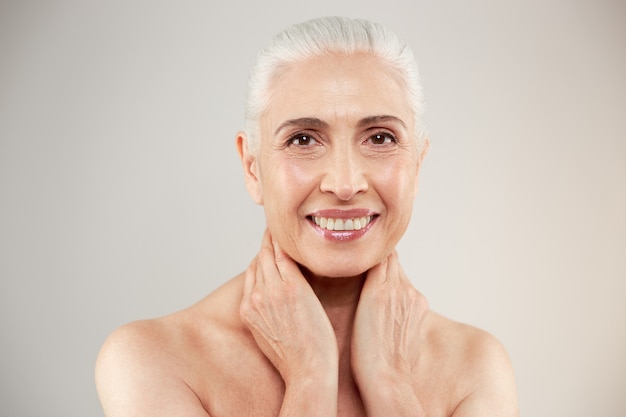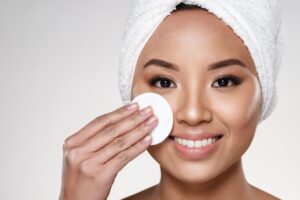Aging is something that we all have to deal with. And while it’s painful to admit, our skin will not always stay supple, smooth, or radiant.
This is because, as we age, our skin undergoes a series of changes. Although some of these changes are delightful, others can be quite frustrating – talk about changes in skin appearance, texture, and even overall health.
To understand the concept of aging and skin health, let’s explore some of the things that are happening beneath the surface.
Elasticity and Sagging
Elasticity is one of the critical properties of the skin. When you’re young, it’s all taut and springy. However, as we get older, the skin’s ability to maintain this resilience diminishes due to the breakdown of elastin fibers, which are essential for keeping the skin firm and supple. This consequently leads to sagging, with fine lines and deeper wrinkles becoming more apparent.
Hydration
Hydration is another key area that sees a dramatic shift as we age. The skin naturally loses moisture more quickly as we grow older leading to dryness and a rougher texture.
The outer layer of the skin, known as the stratum corneum, becomes less effective at retaining moisture, and this worsens the appearance of fine lines, making the skin feel tight and uncomfortable. Additionally, the production of natural oils decreases, further contributing to dryness and a loss of that youthful glow.
Collagen production
Collagen is our skin’s best friend when it comes to elasticity, keeping things firm and plump. However, its production declines significantly as we age.
Collagen is a protein that gives the skin its structure and strength. In our younger years, it is produced in abundance, keeping the skin firm and smooth. However, starting in the mid-20s, and accelerating in the 30s and beyond, collagen production begins to slow down.
And by the time we reach our 50s, collagen levels are significantly reduced, leading to the visible signs of aging like sagging skin, wrinkles, and a loss of volume.
Anti-Aging Skincare Ingredients: Retinoids, Peptides, Vitamin C, and Hyaluronic Acid
Since aging is inevitable, understanding how to care for mature skin becomes paramount, and this involves knowing which ingredients can address these changes effectively.
Retinoids, peptides, vitamin C, and hyaluronic acid are some of the most popular and well-researched anti-aging ingredients available, and in this section, we will briefly discuss them.

Retinoids
Retinoids, including prescription retinoic acid and over-the-counter retinol, are vitamin A derivatives and are widely regarded as the gold standard in anti-aging skincare. These ingredients work by speeding up cell turnover, encouraging the production of new skin cells, and stimulating collagen production.
This means that regular use of retinoids can visibly reduce fine lines, smooth the skin’s texture, and improve overall skin tone. However, you have to be careful because retinoids can be irritating, especially for those with sensitive or dry skin. So it’s often recommended to start slowly and build up usage gradually.
Peptides
These short chains of amino acids serve as building blocks for proteins like collagen and elastin. When applied topically, peptides can signal the skin to produce more collagen, helping to improve firmness and elasticity. They are also excellent for supporting skin’s overall structure when used consistently and in combination with other anti-aging ingredients.
Vitamin C
Vitamin C is a potent antioxidant that neutralizes free radicals, which are unstable molecules that can damage collagen and lead to premature aging.
In addition to its protective properties, vitamin C also promotes collagen synthesis and brightens the skin by inhibiting melanin production. And so, consistent use can lead to a more even skin tone, reduced age spots, and a noticeable improvement in skin radiance.
Hyaluronic acid
This is one very potent hydrating ingredient for the skin. As I mentioned earlier, aging skin tends to be drier, so incorporating hyaluronic acid can help replenish that moisture and plump up the skin. It can also reduce the appearance of fine lines.
Unlike some other anti-aging ingredients, hyaluronic acid is gentle and works well for all skin types, making it an essential part of any mature skincare routine that is focused on hydration.
Let me add that while you can incorporate these anti-aging ingredients into your skincare, there are a few targeted treatments that you can also include.
For instance, treatments like chemical peels, microneedling, and laser therapy can be used to manage fine lines and wrinkles. These processes provide more dramatic results by stimulating collagen production and improving skin texture.
You can also use at-home skincare products containing retinoids or peptides. However, this is only effective if you are consistent.
Additionally, exfoliation plays a crucial role in targeting these concerns. So regular exfoliation, either through gentle chemical exfoliants like AHAs (alpha hydroxy acids) or BHAs (beta hydroxy acids), can help remove dead skin cells, revealing fresher skin underneath and allowing active ingredients to penetrate more effectively.
Now that we’ve discussed the basic ingredients and targeted treatments for mature skin, let us see how you can incorporate these into your skincare routine.
Skincare Routine for Mature Skin
Building an effective skincare routine for mature skin focuses on these few things: addressing dryness, protecting against further damage, and maintaining healthy skin turnover.

First, hydration is a top priority for maintaining healthy skin. So, by incorporating products that are rich in emollients and humectants, such as moisturizers with ceramides, glycerin, and hyaluronic acid, you can lock in moisture and reinforce the skin barrier.
Sun protection is another important factor and remains crucial at every age. Always wear a broad-spectrum sunscreen with an SPF of at least 30 every day. This is a non-negotiable, even on cloudy days, and when you’re indoors. Sun exposure is one of the primary causes of premature aging, so consistent use of sunscreen can prevent further damage and help maintain any progress made with anti-aging treatments.
Regular exfoliation is also key to keeping mature skin looking its best. As the natural cell turnover process slows down, dead skin cells can build up on the surface, leading to dullness and a rough texture.
Therefore, exfoliating 1-2 times a week with a gentle chemical exfoliant can help promote a smoother complexion and enhance the effectiveness of other products in your routine.
One last thing…..
Note that there are conditions known as age spots or hyperpigmentation, which often result from cumulative sun exposure over time. These can be very stubborn to treat, however by combining ingredients like vitamin C, niacinamide, and hydroquinone you may see these dark spots fade over time.
But if you have more persistent hyperpigmentation, professional treatments like IPL (intense pulsed light), therapy or chemical peels may be recommended.
Overall, a well-rounded skincare routine that emphasizes hydration, sun protection, and gentle exfoliation is essential for keeping mature skin looking and feeling its best.











